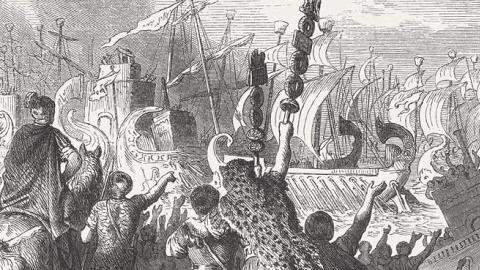On March 15, 44 B.C., Julius Caesar lay dead from 23 knife wounds inflicted by his assassins. The next day, the question on every Roman citizen’s mind was: Who will rule Rome now? Getting to the answer took more than 13 years—until Caesar’s chosen heir, Octavian, crushed his rival Mark Antony in a ferocious naval battle at Actium, a Roman outpost along the Greek coast.
The history of those years is steeped in bloodshed, intrigue and sexual diplomacy. In “The War That Made the Roman Empire,” Barry Strauss relates the story fairly and fluently—in ways that set the main characters in their full historical context and yet also show their relevance to our current moment. One lesson of the epic struggle for control of Rome is that no political system can survive when its ruling elite has lost touch with reality.
Marcus Brutus and his fellow conspirators thought that, by assassinating Caesar the dictator, they had restored the Roman Republic. Instead they found themselves outmaneuvered by the two men who saw themselves as the inheritors of Julius Caesar’s political legacy: Gaius Octavius was Caesar’s great-nephew and Marcus Antonius his former lieutenant. Two years after Caesar’s death, the pair joined forces and crushed Brutus and his army at the Battle of Philippi, clearing the way for each to contend with the other for the final spoils, the Roman Empire itself.
At age 50, Antony was the more experienced soldier and politician. Born to a noble family, he had grown up amid the violence and corruption of Rome’s civil wars—wars that had thrust Julius Caesar to the fore. Octavian, almost 30 years younger and “burning with ambition,” as Mr. Strauss writes, was “a natural politician: intelligent, charming, and careful in his choice of words.” Julius Caesar had made the boy his adopted son and heir, but Octavian was more than a Roman trust-fund baby. He had a ruthlessness that contrasted with his rival’s more gentlemanly character. After Brutus’ suicide, Antony covered his former friend’s body with his own cloak; Octavian had Brutus’ head cut off and set at the foot of a statue of Caesar.
Read the full article in the Wall Street Journal




















